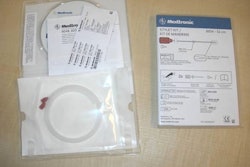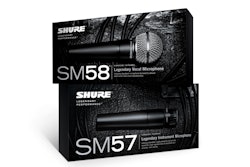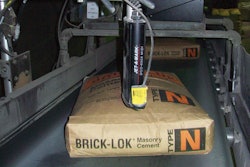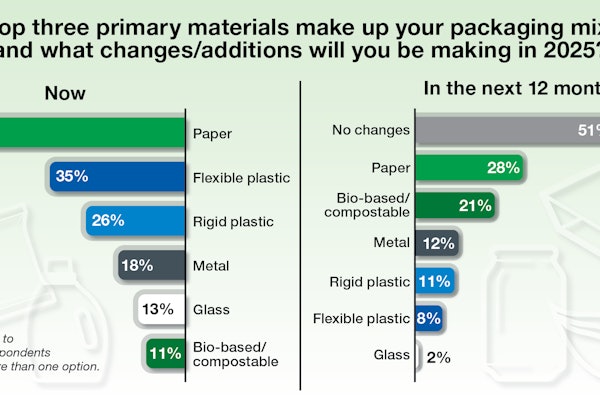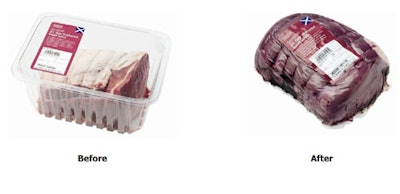
We continue our series of case study examples from Europe provided through U.K.'s Waste & Resources Action Programme. A recent publication from WRAP offers case history examples of gains in reducing environmental waste by its members, primarily packagers and retailers that agreed to the Courtauld Commitment. This example from U.K. retailer Marks & Spencer is the fifth example in our series.
Courtauld Commitment agreement
The Courtauld Commitment is a voluntary agreement between WRAP and major U.K. retailers that supports less packaging and food waste ending up in household bins. The agreement asks for signatories to support WRAP in the achievements of its objectives:
• To design out packaging waste growth by 2008 (achieved: zero growth);
• To deliver absolute reductions in packaging waste by 2010; and
• To help reduce the amount of food the nation's householders discard by 173,600 tons by 2010 versus a 2008 baseline.
To deliver this, retailers, brands, and their suppliers are working in partnership with WRAP to develop new packaging solutions and technologies across the whole U.K. supply chain. This includes using innovative packaging formats; reducing the weight of packaging; increasing the use of refill and self-dispensing systems; and collaboration on packaging design guidance.
Courtauld Commitment Signatory Example–Marks & Spencer
M&S has been working to reduce the environmental impact of its packaging for many years. Its commitment to this has been highlighted by "Plan A," which was launched in January 2007.
Plan A highlights four key packaging commitments for M&S to work toward:
- Reduce non-glass product packaging by 25% by 2012
- Increase the recyclability of packaging
- Use more sustainable materials, such as recycled content, in cardboard and plastics, and
- Label all packs with recycling information to help customers dispose of the packaging in a more responsible way.
One recent example is the company's work to reduce the packaging associated with its beef joints and steaks. M&S was looking for a solution to replace the plastic tray in which the beef joint was previously packaged, but needed to ensure that the preservation of the meat was front of mind. The solution was a skin pack where the film is wrapped tightly around the product.
Not only does this method cut down on the packaging weight by up to 69%, but it also keeps the meat fresher for up to four extra days, which means it is less likely to go to waste.
Comment from Marks & Spencer
“M&S is committed to reducing packaging and working with WRAP as part of our Plan A commitments.”
-Dr. Helene Roberts, Head of Food Packaging, M&S
Courtauld Commitment agreement
The Courtauld Commitment is a voluntary agreement between WRAP and major U.K. retailers that supports less packaging and food waste ending up in household bins. The agreement asks for signatories to support WRAP in the achievements of its objectives:
• To design out packaging waste growth by 2008 (achieved: zero growth);
• To deliver absolute reductions in packaging waste by 2010; and
• To help reduce the amount of food the nation's householders discard by 173,600 tons by 2010 versus a 2008 baseline.
To deliver this, retailers, brands, and their suppliers are working in partnership with WRAP to develop new packaging solutions and technologies across the whole U.K. supply chain. This includes using innovative packaging formats; reducing the weight of packaging; increasing the use of refill and self-dispensing systems; and collaboration on packaging design guidance.
Courtauld Commitment Signatory Example–Marks & Spencer
M&S has been working to reduce the environmental impact of its packaging for many years. Its commitment to this has been highlighted by "Plan A," which was launched in January 2007.
Plan A highlights four key packaging commitments for M&S to work toward:
- Reduce non-glass product packaging by 25% by 2012
- Increase the recyclability of packaging
- Use more sustainable materials, such as recycled content, in cardboard and plastics, and
- Label all packs with recycling information to help customers dispose of the packaging in a more responsible way.
One recent example is the company's work to reduce the packaging associated with its beef joints and steaks. M&S was looking for a solution to replace the plastic tray in which the beef joint was previously packaged, but needed to ensure that the preservation of the meat was front of mind. The solution was a skin pack where the film is wrapped tightly around the product.
Not only does this method cut down on the packaging weight by up to 69%, but it also keeps the meat fresher for up to four extra days, which means it is less likely to go to waste.
Comment from Marks & Spencer
“M&S is committed to reducing packaging and working with WRAP as part of our Plan A commitments.”
-Dr. Helene Roberts, Head of Food Packaging, M&S



